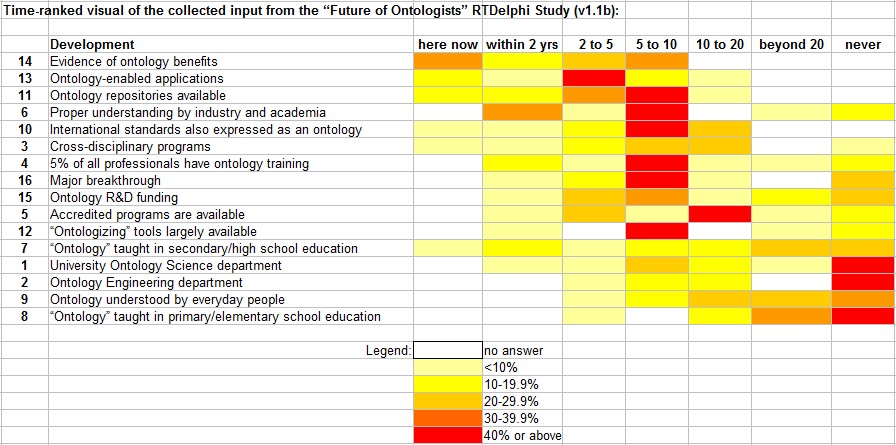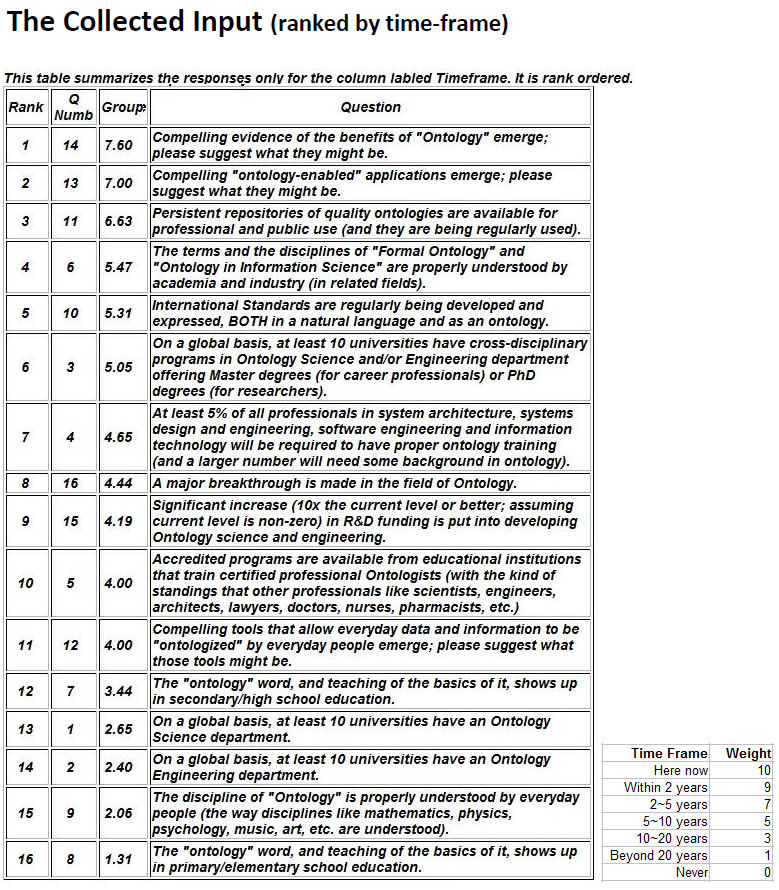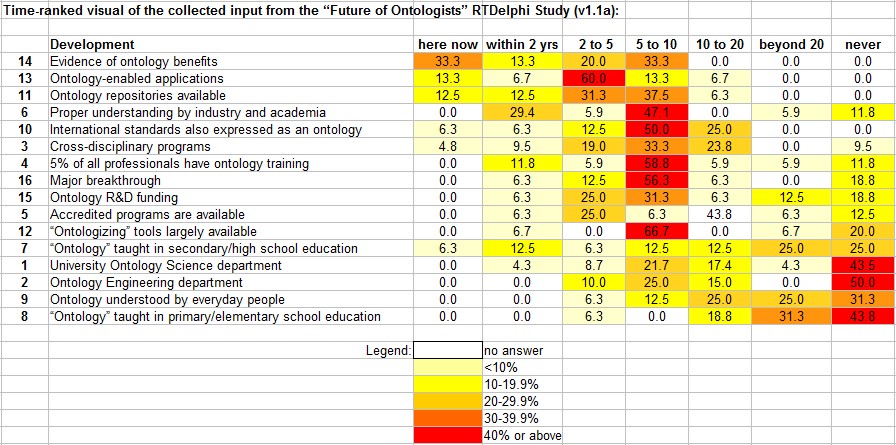OntologySummit2010: Future "Developments" - Synthesis of the Discussion (25H1)
This is the workspace for the co-champions to synthesize the discussion on this track. (25H2)
Track Label: Requirements - Subtrack Label: Future Developments (25H3)
Track Co-champions: ElizabethFlorescu and PeterYim (25H4)
Mission: to develop an outlook on the "Future of Ontologists." we will try to gain insight from the perspectives of: (25H5)
- the market - potential employer of the ontologist; (25H6)
- the educator - the ontology training / education provider; and (25H7)
- the individual - the ontologist (or ontologist-to-be) (25H8)
Pertinent questions: (25H9)
- What major "Development(s)" (please express in one statement) do you foresee happening to the domain of Ontology or to the Ontologist profession in: (25HA)
- What do you see as important trends that are beginning to emerge (w.r.t. the above time horizon)? (25HF)
- How many "ontologists" (or professionals with an "ontology education") will the world need (in the above time horizon)? (25HG)
- When do you think we will start having "ontology departments" in (a) universities and (b) enterprises? (25HH)
- What needs to happen between now and the day when we will have "ontology departments" in unversities and enterprises? (25HI)
SYNTHESIS: (25HJ)
Study on the Future of Ontologists, their Education and the Field of Ontology: Executive Summary (25HK)
by ElizabethFlorescu & PeterYim (2AVB)
The design of an education strategy and a set of training material to properly "Create the Ontologists of the Future," requires some preliminary information on what the future for ontologists might look like. To that end, a future studies technique known as Real-Time Delphi (RTDelphi) was used to collect input from a panel comprising ontology domain experts, those who can influence the future of the field, and visionaries who understand what the potential impact of Ontology might be. (2AVC)
During OntologySummit2010 Panel Session-1 (17-Dec-2009), the community provided valuable input that constituted the base for identifying the developments to be considered for the RTDelphi. (In future researchers' lingo, a "development" is an event or a fact that could have a significant impact on the future of a domain.) The collected input from that virtual community discussion were then clustered and a set of 16 developments were used in the "Future of Ontologists" study RTDelphi questionnaire. For each development, the participants were invited to give input as of the time frame the development would occur, as well as comments on factors that might help and/or hinder its happening. The key question for each development was What is your time estimate for this development to happen? Panelists were also invited to support their answers with reasons, drivers that may help bring about the development in question, as well as barriers and ways to mitigate those barriers. In the RTDelphi, respondents participate by filling out an online questionnaire, and the results both numerical and qualitative are updated instantly as responses are submitted. Respondents can and are encouraged to revisit the questionnaire as many times as they want. Each time, they are shown their own responses as well as the updated answers of the others panelists (although all responses were kept anonymous), and they can revise and change their own input based on this feedback. (2AVD)
The use of the online Real-Time Delphi technique and tools allowed us to reduce the time it takes to produce results from a traditional Delphi study (which nominally takes months) to a matter of a couple of weeks. (2AVE)
A total of 35 people participated in the study: 28 from North America, 5 from Europe, and 2 from South America. (2AVF)
The sectoral demographic was more balanced: (2AVG)
- Private Sector: 29% (2AVH)
- Academic: 26% (2AVI)
- Consultants: 20% (2AVJ)
- Non-profit: 14% (2AVK)
- Government Agencies: 11% (2AVL)
- Other=3% (2AVM)
A summary of the collected input from the RTDelphi study can be found here. (2AVN)
The panelists' estimates of when each of the "developments" is likely to happen were analyzed, ranked, and shown in a graphic form see Figure 1 (below) - to help provide a quick visualization on the level of consensus, polarization of opinions, or if the results were inconclusive among the panelists. (2AVO)
Figure 1: "When will it happen?" - a time-ranked visual of the collected input (2AVQ)
[ a rendering of the above visual with the supporting numbers for the ranking can be found below ] (2EQF)
Key findings and observations: (2AVR)
- There is general consensus from the panel of experts that a lot of these developments will be happening in the next 5~10 years (some earlier, some later, of course! ... see: this summary on exactly how participants responded.) (2AVS)
- the general consensus is that a huge number of people with proper ontology education and training will be needed: say, to the tune of 5% of information systems and software engineering professionals, in the 5~10 year time frame (2AVT)
- given that education and training should be in place before we can actually fill those demands, the sense of urgency to do that promptly and properly, should not be taken lightly (2AVU)
- That the study of Ontology will likely show up as cross-discipline programs, rather than as an Ontology Science or Ontology Engineering department in Universities (2AVV)
- A fair number believed that we already (or will soon) have good evidence on the benefits of the ontological approach, exemplified by (progressively) compelling ontology-driven applications, available ontology repositories and adoption by International standards, which will help drive a better understanding in Ontology and its value by industry and academia (2AVW)
- While R&D funding is supposed to be a leading indicator for the growth in the field of ontology, there is no consensus on its availability, and it appears that it might trail the time frame of other developments (2AVX)
- Somewhat lagging, too, are the availability of tools that might enable the wider adoption of the ontological approach (2AVY)
- It is also generally believed that this discipline of "ontology" will not likely be understood by the masses (as the general public understands the disciplines of mathematics, physics, psychology, music or art, etc.) and, while Ontology education might eventually move into secondary/high school education, it is unlikely that it will show up in primary/elementary schools (2AVZ)
Synthesizing the input from both the Panel-1 session and the RTDelphi input, we see a strong urge by the community toward: (2AW0)
- Clearly defining the discipline so that the field can settle in (as is, even practitioners are sometimes confused) (2AW1)
- Making the investments in Education and R&D that befits the potential impact that Ontology promises (2AW2)
- Develop the required body-of-knowledge and the curricula so as to provide reference for educators and trainers (2AW3)
- Developing compelling applications so that others outside of the field can appreciate the value of the ontological approach (2AW4)
- Developing the tools that will allow ontologies to be applied by more users (than just the experts) (2AW5)
We encourage those who are interested to look over the wide range of opinions from the collected input to make your own assessments and use that to support your own decision making as appropriate. (2AW6)
A presentation on the above was made during our Panel-5 session - see the archive (slides, audio etc.) of it at: http://ontolog.cim3.net/cgi-bin/wiki.pl?ConferenceCall_2010_03_04 (2AW7)
Community input collected from the RTDelphi Study (2ARP)
- Study Report ( as presented at ConferenceCall_2010_03_04 ) (2ARS)
Summary of collected input (2ARQ)
"When will it happen?" - a time-ranked visual of the collected input (with the supporting numbers) (2ARX)
Clustering of input collected at the 2009.12.17 Panel-1 session (279C)
(ref. community Input: http://ontolog.cim3.net/cgi-bin/wiki.pl?ConferenceCall_2009_12_17#nid25QA ) (279D)
(ref. from these input, 16 "developments" were identified and selected to be used on our RTDelphi Study - see: http://ontolog.cim3.net/cgi-bin/wiki.pl?OntologySummit2010_PertinentQuestions#nid2591 ) (28FA)
Developments: (279E)
As a "science" ... (279F)
- ontology gets accepted by the scientific community as a science, like physics, chemistry, biology, psychology, ... (279G)
- Ontology becomes separated from Philosophy as a scientific method the way the Psychology did in the late 19th century (279H)
- Ontology will become a standard course in teaching bioinformatics (279I)
- A standard text becomes available for the core course in the same way that this happened for Cognitive Psych in the 1960s. This identifies the core topics and issues and addresses them in a standard way. (279J)
As an "engineering" ... (279K)
- ontology engineering will be accepted as an engineering discipline like electrical engineering or software engineering ... (279L)
- The domain of Ontology will be established as an (mostly) Engineering discipline that cross-cuts other disciplines (279M)
- ontologies will change way systems engineering and software design is done (279N)
- Ontology will become an accepted part of software engineering processes (279O)
- Ontologists becomes formally trained professionals that will be able to develop ontologies (as software/hardware artifacts) which can be seamlessly consumed by various software/hardware artifacts (279P)
As a "cross-disciplinary" department in its own rights ... (279Q)
- ontology becomes a multi-headed discipline with specialisms of its own (279R)
- Ontology will become as broad a spectrum of service and study as Computer Science (279S)
- ontology is not recognized as a discipline, but rather recognized as being useful to a broad range of disciplines (e.g. there will be demands for ontology training from biology, medicine, humanities or social science people) (279T)
- there will be Departments of Ontology that perform a service function not unlike that of Departments of Biostatistics, in Schools of health sciences (like medicine, pharmacy, nursing, etc) (279U)
Mainstream recognition ... (279V)
- ontologists can make a decent living (279W)
- --> ontologists are recognized as a professional like scientists, engineers, architects, lawyers, doctors, ... (279X)
- Ontology becomes a part of the industrial standards life-cycle (all standards, inter alia, in ontology form + ontologisation as part of QA) (279Y)
- techniques will be developed to eliminate cultural bias from ontological methods (279Z)
- (In 20 years,) ontology will just be background information that everyone is used to (27A0)
Trends: (27A1)
- semantic search techniques becomes prevalent (27A2)
- the semantic web becomes prevalent (27A3)
- The field of Ontology will transcend domains/markets etc. (27A4)
- Routine use of ontology will enable a revolution in the flexibilty of information systems to be expanded beyond their original purpose (27A5)
- Ontologies will be a foundational component for semantic technologies and knowledge-based systems (27A6)
- Ontology will separate itself from the Semantic Web buzz (27A7)
- In 20 years, ontology might just be background information that everyone is used to (27A8)
- The field will be opened up, will not be as bound to FOL constraints as is currently presented (27A9)
- Tools/technologies/best practices will (continue) to emerge to support the field (27AA)
How many "ontologists" needed in 20 years? (27AB)
- at least One million (27AC)
- if we have 4-500 now we would have 4-5,000 by then since we would have 5 years or more of graduates from accredited programs (27AD)
- The equivalent number of data base professionals, data-model professionals, AI professionals, and mathematicians needed today are the number needed within 10 years (27AE)
- At least 5-10% of the personnel on a software engineering project will be required to have significant ontology training, and a larger number will need some background in ontologies (27AF)
- Half of the number of Engineers (27AG)
- over 10K (Market: current: 1k; 20 years: 10k; Education: current: 100; 20 years: 1k; Ontologist: current: 1k; 20 years: 10k+) (27AH)
Future of ontology in academia: (27AI)
- ontology development paradigms and precepts will permeate to all engineering disciplines (27AK)
- there will be Departments of Ontology that perform a service function not unlike that of Departments of Biostatistics, in Schools of health sciences (like medicine, pharmacy, nursing, etc) (27AL)
- I see it incorporated into existing plans, replacing systems design as an evolutionary step (27AM)
- In 20 years there may still be more inter-disciplinary programs with Ontology as part of that, than pure Programs (27AN)
- Doctorate degrees in "Ontology" with specialized areas of study within 10 years (27AO)
- I expect the first master programs in ontology within the next 10 years (27AP)
- In 10 years there will be many departmental groups for ontologies, but not many full departments (27AQ)
- There will be degrees which will focus on Ontology Engineering. There will be courses on Ontologies offered by programs in Computing, Engineering, Medicine, Biology, Philosophy, Library Sciences, etc. (27AR)
- Education: immediate need for an ontology dept that offers undergraduate and postgraduate degrees. My guess is that from now to 2 years, these will be interdisciplinary degrees at postgraduate level; at undergraduate level, there will be minors (i.e., a few courses in computing, philosophy, linguistics, cognitive science programs). In 5 years, there will be ontology departments (27AS)
What needs to happen ... before we have Ontology Depts in universities and enterprises? (27AT)
- we need convincing applications (27AU)
- Ontology needs to become a mature engineering discipline with an accepted methodology and evaluation criteria (27AV)
- to form Ontology Depts (in enterprises) We need credentialing for employers to weigh professionals against (27AW)
- Wide spread adoption of semantic technologies in the marketplace will be a prerequisite (27AX)
- There has to be a market recognition that it is something more than systems engineering as it happens now, and not just resume fodder (27AY)
- More rigorous foundations and methodology, together with solid applications (27AZ)
- it needs to become clear to industry that ontology training is available and a worthy investment (27B0)
- Chicken and egg issue, but we need an agreement on the field and its relations to other fields, how it fits into IT courses, cognitive science etc. And then we need success avoiding the Cyc phenomena of bit effort with less payoff (27B1)
- A more pragmatic answer may include the availability of useful and effective tools and services that use ontologies for their operation (27B2)
- Math, Logic, Philosophy IT and Engineering Department Faculty has to become aware of this emerging powerful discipline (27B3)
- We need curricular materials (textbooks, readily available courseware, curriculum guidelines) as well as professional/academic organizations (27B4)
- Exogenous forces (industry/government) endogenous forces (academia) (27B5)
- Bodies such as IAOA need to establish criteria for knowledge, skills, quality requirements, for personal certification and academic/professional accreditation. Otherwise, these will be based on efforts of "heroes" within universities and companies, which will be typically good but idiosyncratic (27B6)
- Ontology is currently an Art (or even a bit of philosophical hand waving), which we hope will evolve into a science, of correlating concepts from across different cultural perspectives (27B7)
What does the general public need to know about "ontology"? (27B8)
- The general public would benefit from knowing there is a spectrum in "ontology" per Leo's famous graphic (27B9)
- The public would also benefit from knowing how Ontology tools help address key issues in technology and understanding (27BA)
- The characteristics of ontology that differentiate it from the many other information-based technologies out there (27BB)
- just that machines are dumb and people need to tell them how the world is (27BC)
- computers don't know what exists in the world, we have to tell them, and we have to be very careful about doing so, because otherwise they draw bad conclusions. And it turns out to be a very tricky thing to do, despite how easy it sounds. (27BD)
- kids ought to be able to understand ontology (27BE)
- Start in grade school the way we do with computer literacy. Build an appreciative public in general. Target undergraduate education leveraging connections to Psychology and SE etc. (27BF)
- Programs in NPR, articles in Scientific American, such as that on Semantic Web by Berners-Lee et alia (27BG)
- this new practice of old known discipline is beginning to address and solve problems as exemplified in EU and US by the number of problems in Bio, Med, Onco, DHS security and events analysis etc. or for datamining etc this discipline is worth looking at as a component in your self study professional study or formal training (27BH)
- That by using ontology design principles, better systems can be built; the systems will work together better because the individual components of what something "means" will be better defined (27BI)
- Ontological engineering is a method to represent knowledge in a machine readable way. It allows to separate executable code (written by software engineers) from the knowledge about a particular domain (maintained by domain experts/ontologists) (27BJ)
- Ontology is the background terms, concepts, and relationships that describe a domain. Ontologies can help organize information, help in searching, and help resolve multiple terms that are related. (27BK)
- I would expect them to know initially (today) only that ontologies are models which are used in computer science and software that represent ways that human think about the real world. So ontologies represent knowledge that humans know about the world and wish to impart to software, so that software can more directly use human knowledge and thus interact with human software users at their level (27BL)
- Ontology is currently an Art, which we hope will evolve into a science, of correlating concepts from across different cultural perspectives (27BM)
- Ken asked "why is it necessary to educate the general public? It is rare for someone in the general public to know what linguistics is, but that did not prevent there being a lot of linguistics departments." I might think that the public experiences quite a bit about English and language in its elementary and high school education and a modest amount of analagous exposure to semantic issues would be useful in their education and apreciation for what goes on in Ontology work in Universities (27BN)
This page is maintained by ElizabethFlorescu and PeterYim Please do not edit or modify it yourself; send any editing request to any one of the individuals named above. (25HL)



